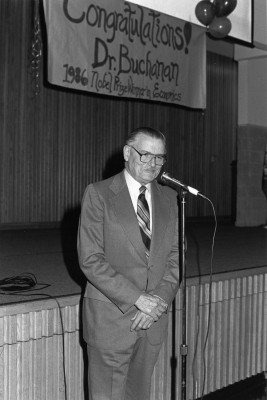Modest, intelligent and hardworking, are just three adjectives that President Emeritus Alan Merten believes would describe George Mason University’s first Nobel Prize winner, Dr. James (Jim) Buchanan.
On Jan. 9, the former professor of economics, Buchanan, passed away at the age of 93 in his home in Blacksburg, Va. Dr. Merten believes that Dr. Buchanan’s accomplishment with his Center for the Study of Public Choice and eventual Nobel Prize in economics helped Mason become the university it is today.
“Fourteen years after [the university] was started up it had a Nobel Prize winner,” Dr. Merten said. “Without Jim, George Mason just would not be what it is.”
Buchanan’s work is often times attributed with putting the young George Mason University on the map.
“The history of George Mason is one of continual progress and continual advancement, always moving forward. There are four things in the life of George Mason that catapulted it up another dimension. The first one is in 1986, when Jim Buchanan won the Nobel Prize in economics,” Merten said.
Merten was not the only university president who believed that Buchanan and his team’s accomplishments were instrumental in the success of George Mason University.
President Emeritus George W. Johnson hired Dr. Buchanan in 1983 because he believed his work would have a large impact on the success of Mason.
“The impacts on this institution were unbelievable. [Dr. Buchanan’s] award just cemented in place his role at Mason,” said Dr. Johnson.
Not only was Buchanan a celebrated economist and colleague but according to Merten, he was a truly modest individual.
“He would say things like, ‘I won the Nobel Prize’, but he did not know why. What he won it for to him was so obvious, he did not think it was deserving of the Nobel Prize,” Dr. Merten said.
In 1986, The Royal Swedish Academy of Science awarded Dr. Buchanan the Nobel Prize in economics for what they call his revolutionary theory on economics and political decision making. A theory which he coined as “Public Choice”
In 1983, he moved his Center for the Study of Public Choice from Virginia Tech to George Mason University and only three years later he would receive the first Nobel Prize given to a Mason professor and in the commonwealth of Virginia.
Buchanan retired from the university in 2007, but according to Merten, retirement did not mean he would stop working. Dr. Buchanan insisted that even though he was retired, he would continue his work on Public Choice.
“When he turned 80, he told me he was going to retire. But what retirement meant was that I did not have to pay him anymore,” Merten said. “He was still going to come into the office regularly, he was going to have graduate students that he going to work with, and he was still going to travel.”
Merten believes that no one would have guessed how famous he was because Buchanan was modest but also very dedicated to his work and his colleagues throughout his career.
Buchanan would spend almost 50 years working with Dr. Gordon Tullock, a former Mason professor in Law and Economics.
“He was committed to his students and he was committed to his fellow faculty members. It was not all about him, it was about the people he worked with,” Merten said.
According to Merten, one of Buchanan’s closest work relationships was with his secretary, Betty Tillman. Tillman worked with Dr. Buchanan from 1961 until her retirement in 2005 and was even present at his Nobel Prize ceremony in Stockholm, Sweden.
After Tillman’s retirement, Jo Ann Burgess stepped in as Buchanan’s secretary.
Burgess currently is the archivist/librarian of the Buchanan House a house that sits right behind Presidents Park, which used to house university presidents, and now collects the entire Center for the Study of Public Choice’s studies and paperwork.
Buchanan earned his doctorate from the University of Chicago in 1948. Before that, he served on the staff of Navy Admiral Chester W. Nimitz during WWII.
Throughout his tenure as a professor of economics, Buchanan taught at numerous schools around the country, including Florida State University, University of California, Los Angeles, the University of Virginia and Virginia Tech.
Buchanan authored numerous books on his analysis of economics and political decision making. He was against deficit national spending and was in favor of a balanced budget amendment. Buchanan explained his ideas in his book, “The Calculus of Consent,” which he co-authored Dr. Tullock.
The current Chair of Mason’s Department of Economics, Dan Houser, said they are in the process of planning a memorial service for Dr. Buchanan, which is tentatively scheduled to be during the fall 2013 semester.
Johnson believes that Buchanan did a lot more for this young university than much of the Mason community realizes
“No single person had so much impact on the development of this institution than Jim Buchanan,” Johnson said.







Comments